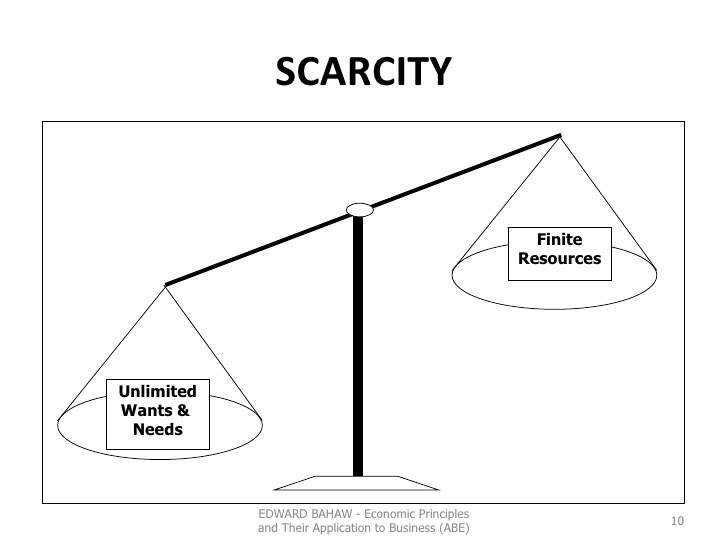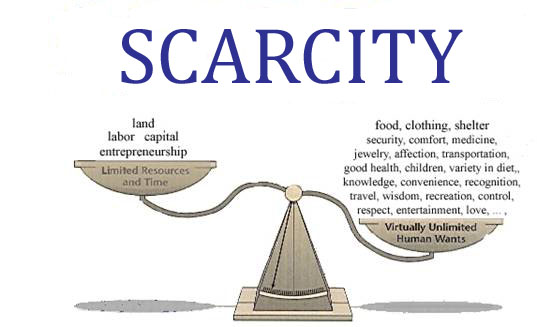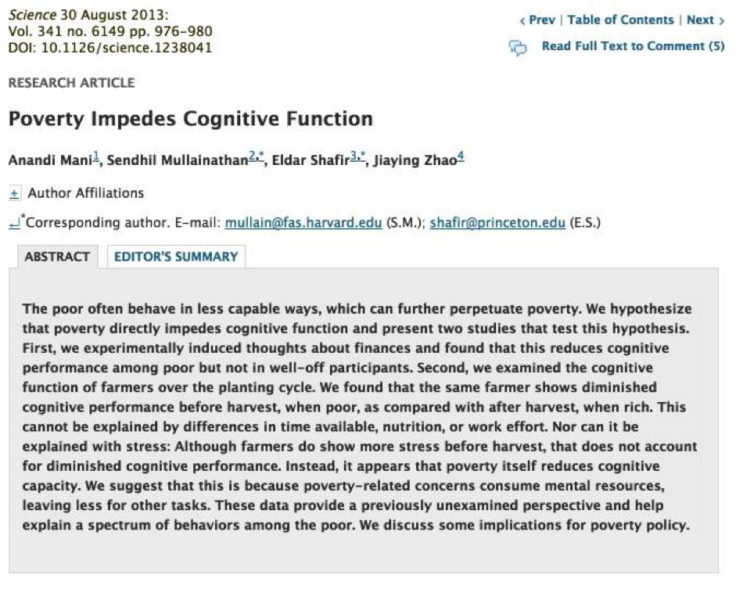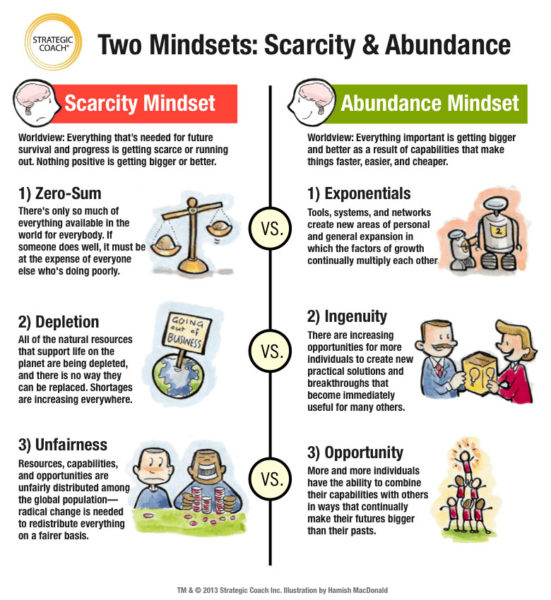How Scarcity Changes Our Brains And Boosts Your Conversion Rates
Hurry! Get it while supplies last! Columnist Jeremy Smith explains how a conception of scarcity affects the brain and how marketers can respond to it to drive conversion rate optimization.

The human brain is a marvelous thing. It’s astounding in its power and baffling in its limitations.
I’ve long believed that the power of conversion optimization is found in three main things — an intensive obsession with data and testing, a heuristic for approaching a site’s conversion potential and a deep understanding of human psychology.
This is why so many of my articles focus on the importance and application of psychology in conversion optimization.
Psychology works. It’s one of your strongest allies in the improvement of conversion rates. The more you understand it, the more you can unleash its power.
Scarcity is one aspect of humans’ mental models that has significant implications in the CRO world.
What Is Scarcity?
Wikipedia defines scarcity in the following way:
[blockquote] Scarcity is the fundamental economic problem of having seemingly unlimited human wants in a world of limited resources. It states that society has insufficient productive resources to fulfill all human wants and needs.[/blockquote]
Although this definition focuses on the economic implications of scarcity, it is significant for our purposes.
The basic idea is that 1) we want stuff, but 2) the world is running out of stuff.

I’m less interested in the dictionary definition than I am in how this actually affects people’s thinking.
Here is what happens when people conceive of the world as a place overcome by scarcity:

It’s true that humans want a lot of stuff. The desire for things, whether material or immaterial, is persistently greater than the ability to satisfy those desires.
The way that the mind makes sense of this is by viewing the world through a lens of scarcity.
How Does Scarcity Impact The Brain?
The most revolutionary aspect of scarcity is that it is a mental model — an internal construct that defines how we think and what we do.
Is scarcity truly a problem? Yes, but only when our desires are great.
The scarcity mentality affects everyone to varying degrees. Evolutionary theorists say the brain’s instinctive scarcity mindset has contributed to the preservation of the species.
As the theory goes, it was necessary for our hunter-gatherer ancestors to identify scarce resources and proactively compensate for the perceived lack through the collection and accumulation of food.
We still have this scarcity mentality, even when we don’t need it. Besides, the abundance yang of the scarcity yin translates into massive desires. Because our desires are so overblown, we feel like the world is a place of scarcity.
(It’s important to point out that there truly are aspects of human need that are essential, and in which scarcity has a devastating role. The tragic insufficiency of clean water, medical care, food and other physical requirements is leading to the demise of many people around the globe. This component of scarcity is very real, highly problematic and should be addressed by those who are in a position of privilege and security.)
What Happens Upon Entering The Scarcity Mindset
Here’s what happens to the brain when we enter the scarcity mindset:
The Scarcity Mindset Makes Us Focus On The Things We Don’t Have.
When you’re in a “scarce” frame of mind, you think more about your wants than your haves.
A simple way to illustrate this is through the body’s hunger mechanism. Hunger is a real need, but when we think about our hunger, we do not focus on the sense of satiety that we had after a previous meal.
We anticipate the next meal, and putting food into our mouths again.

The focus on desires can drive us crazy.
Perhaps this is why motivational speakers tell us that “the secret of having it all is believing you already do.”

Such an aphorism helps to orient those of the scarcity mindset into recognition that we have plenty.
The Scarcity Mindset Makes Us Risk-Averse.
For the scarcity-minded, risk is just too risky. Instead of focusing on the “big reward” side of the risk equation, they fixate only on the potentially negative consequences.
Risk-aversion can have a unique impact on your conversion optimization plans.
The Scarcity Mindset Makes Us Distrustful And Suspicious.
The scarcity mindset has as its corollary distrust and suspicion. Other people are viewed as competitors for the limited resources.
It’s fairly obvious why the scarcity mindset has such negative personal implications.
The Scarcity Mindset Makes Us Act Quickly.
If there isn’t much of something, then you want to act quickly to get it, right? This is one of the major marketing upsides of the scarcity mindset. It makes people move.
The Scarcity Mindset Makes Us Unlikely To Share.
You’ve probably watched small children at play. Sometimes, a child becomes so fixated on his or her own desires that she refuses to share. In such a situation, she is focused on her desire to play and cannot transfer these mental feelings to someone else.
This action stems from a scarcity mindset. We do the same thing with our resources. We do not give freely to others because we want to hang on to our limited resources.
People will share only when they have some powerful motivation other than altruism. Sharing requires a low-risk/high-reward proposition.
In social sharing, for example, the risk is low. It doesn’t cost you anything to “share on Twitter” or “like on Facebook.”

The Scarcity Mindset Makes Saving A Priority.
Scarcity-mindedness makes us more likely to save.
If you live in a cabin with a wood-burning stove in a place of long winters, you’ll want to save your firewood.

If you live on a fixed income and want to buy a car, you’ll try to save money to purchase the one you want.
Saving is logical and right. When scarcity overwhelms us, however, such a mindset becomes massively prioritized, making us look miserly rather than smart.
The Scarcity Mindset Can Paralyze Decision Making.
It’s harder to make decisions when operating from a scarcity mindset.
There’s a reason for this. Poverty actually reduces cognitive functionality.

The Scarcity Mindset Prefers Small Choices To Big Decisions.
It’s easier to choose what to wear than it is to decide which house to buy. Bigger decisions require more mental strain. Thus, when we’re in a scarcity mode of thinking, we prefer to make only little decisions.
A small purchase is one example of a small choice. Spending $1.99 on coffee is more likely than spending $28,900 on a new car.
The Scarcity Mindset Seeks External Approval Of Decisions.
People want to know that their decision — to buy, to share, to join and so on — is a good one. They will respond favorably to external validation by peers, or even from an online automated message.
The Scarcity Mindset Is In Crisis Mode.
True scarcity is a crisis. A scarcity mindset, on the other hand, develops mental crisis where there is no true crisis to be found.
People who are experiencing a scarcity thinking process will operate like we’re all gonna die, even if we’re all gonna be just fine.
The Scarcity Mindset Produces A Transactional Form Of Behavior.
In other words, you just want to get it done and over with. You’re not likely to join the Facebook club, participate in a survey, or do anything else that requires time or effort.
You just want to spend your money and get out.
The Scarcity Mindset Makes Us Prone To Accept Anything And Everything.
A person who is suffering from a shortage of water will drink from a muddy source.
A person who is suffering from a scarcity mindset is more likely to buy a crappy car, get what he or she needs from a shady ecommerce site and buy low-quality merchandise.
The Scarcity Mindset Takes Advice From Any Source.
The mental effect of scarcity is that it makes us, in one sense, teachable. We’re willing to take in information, but only if that information coheres with our scarcity thinking process.
It’s more appropriate to call this form of thinking gullibility rather than teachability.
The Scarcity Mindset Is Loath To Part With Resources.
If you are experiencing a scarcity mentality in one area of life, it makes you tighten your hold on all other resources.

For example, let’s say that you have a scarcity of cash. If you feel this way, you are more likely to feel like you have less time, less patience and less overall enjoyment of life.
You are not willing to give anything away — your joy, your patience, your time, your grass clippings. Why? Because you are overwhelmed by an idea of scarcity, and you are responding in the only way that you know how: Save all the things!
The Scarcity Mindset Builds Fear, Which Produces Its Own Mental Burden.
The scarcity mindset is closely related to fear.
Fear is a massive emotional burden, regardless of how much mental stamina and integrity you have. Fear produces a cascade of negative emotional corollaries that will make it difficult for you to do just about anything.
What Does This Mean For Conversion Rate Optimization?
I’m going somewhere with all of this scarcity mindset stuff. If you’re familiar with the world of conversion optimization, then you’ve probably been able to anticipate some of my direction.
Allow me to make one point very clear: It is not appropriate to take advantage of people, especially by targeting something as crippling as the scarcity mindset.
Scarcity has profound negative psychological results, and we do not want to compound this negativity. What do we do instead?
The chief method of implementing scarcity as a conversion technique is through the power of limitation.
An article in Influenceology offers a standard explanation of this technique:
[blockquote]Scarcity refers to any limitation placed on a product or service with the goal of increasing sales through pressure placed on the consumer. The fear of missing out causes people to make the decision to buy. The limitation can be a time-based deadline or a limited quantity, often mixed with some kind of perceived benefit for acting quickly, like a reduced price, a bonus item, or an increase in status (you got in, where others missed out).[/blockquote]
When there is an apparent abundance of items, there’s no urgency for acquiring one.
If grape juice were the most plenteous liquid on the planet, nobody would be rushing to bottle it. But if there were a plague that killed off all the grapes, grape juice would suddenly become a high-priced and valuable commodity.
When your product or service appears to be scarce, it tends to drive demand and increase urgency.
Scarcity encourages action. Even if the scarcity is simply a customer perception, the action continues apace.
There are other aspects of the scarcity mindset that we must respond to.
Accept The Scarcity Mindset As A Reality
Instead, we as conversion optimizers should respond to a prevailing scarcity mindset in a way that recognizes that people really do experience it.
How many people suffer from the scarcity mindset? As fuzzy as it is, it’s hard to say. I wasn’t able to come up with any statistics.
It is safe to say that we all probably feel the scarcity mindset in different ways and at different times.
When we realize that people do experience this mental phenomena, we can tailor our marketing methodology and conversion rate strategy.
Respond To The Scarcity Mindset In Appropriate Ways
So what should we do? Based on the way that the mind is affected by scarcity, here are the ways that we should respond for conversion optimization:
The scarcity mindset makes us risk-averse:
- Minimize risk or the appearance of risk.
- Use language that sympathizes with the user’s risk and seeks to overcome it.
- Use low-risk or no-risk conversion choices, like subscribing to an email list.
The scarcity mindset makes us distrustful and suspicious:
- Use trust signals wherever possible.
- Feature testimonials.
The scarcity mindset makes us act quickly:
- Increase urgency — the need to act quickly — by highlighting the scarcity of the product.
- Increase site speed.
- Make it easy for users to find what they want.
- Streamline the checkout process.
The scarcity mindset makes us unlikely to share:
- Implement social sharing. It’s an easy and low-risk method of sharing that is more likely to produce action.
- Offer some reward for sharing. Don’t depend on altruism.
The scarcity mindset can paralyze decision making:
- Make it easy for people to make decisions. In fact, don’t make them make a decision at all. Just let them go through the funnel as smoothly as possible.
- Satisfy the user’s need for an easy solution to an obvious problem.
The scarcity mindset prefers small choices to big decisions:
- Coax conversions through a sequential process of little decisions rather than a monumental and overwhelming big decision.
- Provide low-risk and small purchases along with big-risk and large purchases.
The scarcity mindset seeks external approval of decisions:
- Congratulate the user on a choice well made.
- Allow them to share their purchase or conversion decision socially.
The scarcity mindset is in crisis mode:
- Seek to allay any concerns about the site’s security, validity or any other possible trigger that could derail the conversion process.
- Provide consistent validation throughout the website, especially in the conversion funnel.
The scarcity mindset produces a transactional form of behavior:
- Users want to get it over with. Don’t add unnecessary steps.
The scarcity mindset takes advice from any source:
- Create a content marketing strategy that educates and advises with the highest-quality content available.
- Assure users through education.
- Use content marketing and SEO methods to provide top results for informational queries, which will then allow users to enter your conversion funnel.
The scarcity mindset is loath to part with resources:
- Only require what is necessary from the user. If you want their money, ask for their money. If you want their email address, ask for their email address. Don’t ask for everything all at once.
- Offer the user something. Free resources like e-books are always a great idea.
The scarcity mindset builds fear, which produces its own mental burden:
- Fear is part of the mess of friction that interferes with every conversion process. Make it a conversion optimization priority to eliminate fear as much as possible.
Conclusion
It should be fairly evident, even from a cursory overview, that in conversion optimization the scarcity mindset is mostly a positive — transactional mindset, quick to act (convert), willing to take advice.
By acknowledging this mindset and addressing it, your conversion optimization efforts will take on new heights of awesomeness.
Contributing authors are invited to create content for MarTech and are chosen for their expertise and contribution to the martech community. Our contributors work under the oversight of the editorial staff and contributions are checked for quality and relevance to our readers. MarTech is owned by Semrush. Contributor was not asked to make any direct or indirect mentions of Semrush. The opinions they express are their own.
Related stories
New on MarTech